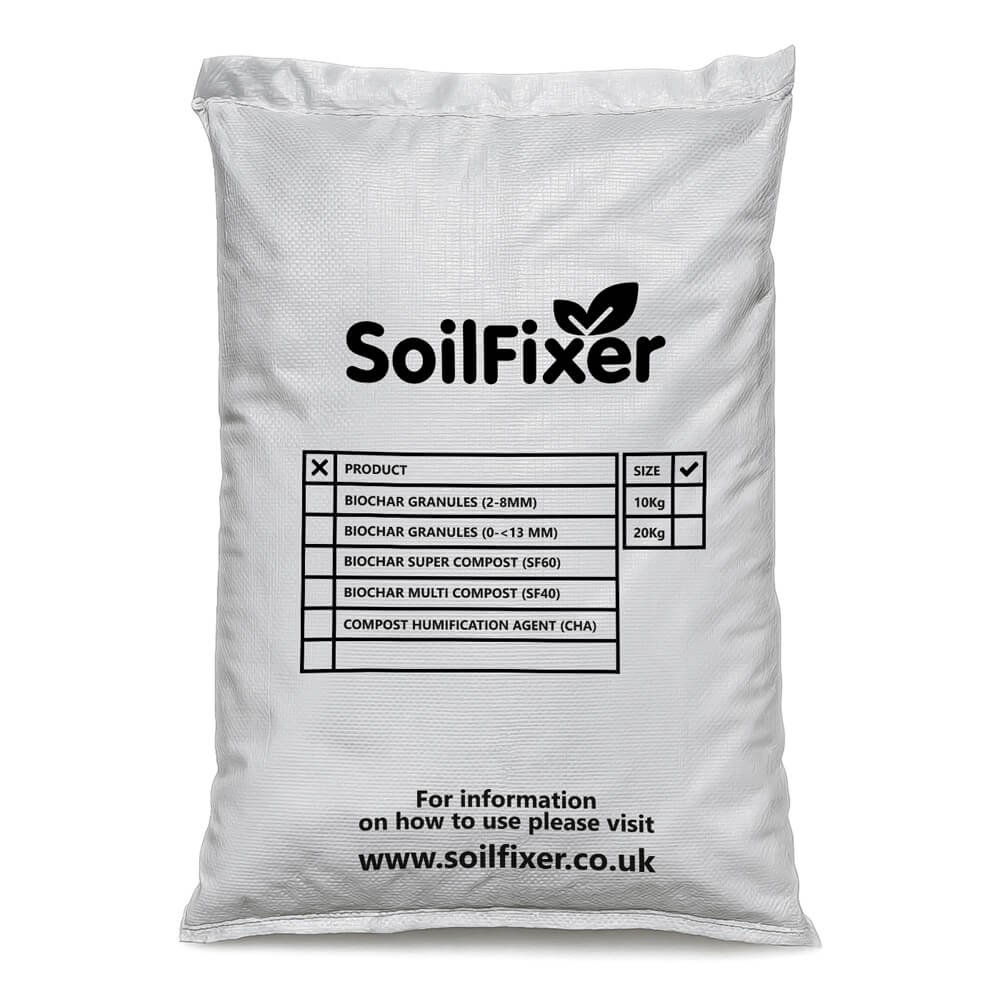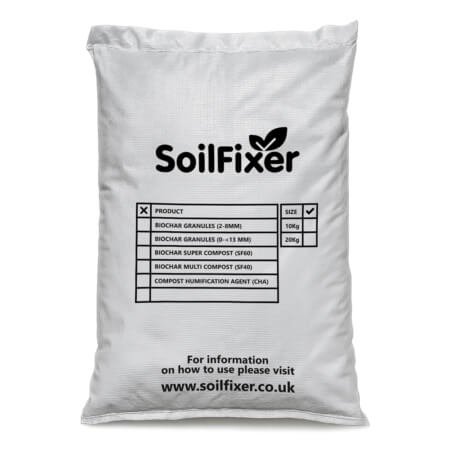Biochar Granules (0-8mm)
SoilFixer’s Fine Biochar (0–8 mm) is a high-quality soil enhancer ideal for precision applications in gardens, pots, raised beds, and lawns. The finer granule size means faster integration into soil, improved surface area for microbial colonisation, and quicker interaction with nutrients and water. It boosts water retention, reduces nutrient leaching, and supports strong root development—especially beneficial for seedlings, potted plants, and sandy soils. Sustainably produced in the UK, this biochar also promotes long-term soil health by supporting beneficial microbes and mycorrhizal fungi.
If you need large-quantity loose loads (e.g. 10–20 tonnes), please contact us.
Why Use Biochar
Biochar made from wood supports enhanced microbial and fungal growth. These microbes live in the pores of the biochar and access the stored nutrients. In turn, they form symbiotic relationships with plant root hairs – transferring nutrients to the roots in exchange for sugars (food) from the plant.
There is growing evidence that this root zone activity goes beyond just nutrient transfer. While the exact mechanisms are not fully understood, it appears that biochar helps create a community of mutual defences against pathogens and disease – resulting in improved plant vitality and increased resistance.
At SoilFixer, our own testing and analysis have led us to use only biochar made from wood. We sieve and grade the particle sizes to improve soil microbiology, aggregation, and tilth.
Biochar Features
- Improved plant and vegetable growth
(We are confident biochar will deliver +20% plant growth) - Better water retention
- Enhanced nutrient supply to roots
- Reduced nutrient runoff
- Supports microbes and AMF (mycorrhizal fungi)
- Helps form and stabilise colloidal humus
- Improves soil tilth
Environmental Benefits
- Locks carbon in the soil for hundreds of years (carbon capture)
- Offsets your carbon footprint – 1 kg biochar ≈ 2.0 kg of CO₂
- Reduces NOx and methane emissions from the soil
Where to Use Biochar
- Planters
- Raised beds
- Allotments
- Lawns
- General gardens
- Compost mixes
Quality
Our biochar is made from 100% arboricultural arisings – this includes tree and hedge trimmings, prunings, and other wood waste. It is certified to the EBC (European Biochar Certificate) standard.
Production is carried out using pyrolysis kilns, which heat the material without oxygen – a cleaner and more effective method.
Read more about why this matters for your garden and the environment in our blog.
How to Apply Biochar
Raw biochar needs time to absorb nutrients and develop root zone relationships – this can take 3 to 6 months. This ‘lag’ period can be shortened by charging (activating or enriching) your biochar before adding it to the soil.
Methods to charge your biochar:
- Add it to your composting process and mix it into your compost
- Soak it in a liquid fertiliser before applying
If you prefer a ready-to-use product, check out our Biochar Multi-purpose Compost (SF40).
The most powerful benefits of biochar come from its interactions within the root zone. Ideally, dig biochar in when planting (e.g. seed drills, tree holes, or when cultivating). If this isn’t possible – such as in no-dig gardening – biochar can also be used as a top dressing or hoed into the top few centimetres of soil.
Should I Use Powder or 0–8 mm Granules?
Our 0–8 mm grade biochar achieves the ideal balance of particle sizes:
- Approx. 40% <2 mm
- Approx. 60% 2–8 mm
Trommel sieves may allow a few long, thin bits to pass, so some particles may slightly exceed 8 mm.
We do not recommend using fine biochar powder (amorphous biochar) because it lacks the macro-pores needed by soil microbes. We also advise against using very large granules (>8 mm), as they offer low pore surface area and can negatively affect soil aggregation (tilth).
Read more in our biochar blog.
How Much Biochar Should I Apply?
- Apply 1 kg per square metre (1 kg/m²)
This is roughly equal to 5% by volume, although it depends on soil depth.
For more information on how to calculate by area, volume or weight – and how to stretch your biochar budget – see our application ratio blog.
Volumes and Weights
Biochar naturally absorbs water, and moisture content varies with the seasons. That’s why we sell by volume (litres) and provide an approximate weight.
- 20 litres ≈ 10 kg
- 40 litres ≈ 20 kg
Our product contains approximately 40% water by weight.
If comparing prices across suppliers, make sure you’re comparing volume (litres) or adjusting prices to reflect £/kg of dry biochar.





